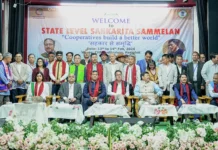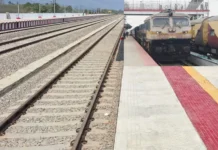NEW DELHI, 6 Dec: Representatives of urban local bodies (ULB) from various Indian Himalayan states and regions met here on 4 and 5 December as part of ‘Parvat manthan’, “a dialogue platform for manifestation of clean and sustainable hills initiated by the National Institute of Urban Affairs (NIUA),” the NIUA informed in a release.
The meet was facilitated by the NIUA and the BORDA, in collaboration with the Integrated Mountain Initiative (IMI), at the India Habitat Centre here. The main objectives of the workshop were to assess the
capacities of the ULBs with regard to the 74th amendment, to understand the major bottlenecks, and to delineate future action towards holistic sanitation planning.
Mayors, chairpersons and councillors from ULBs and autonomous hill councils from Shimla, Palampur, Ladakh, Gangtok, Darjeeling, Pasighat, Aizawl, Lunglei, and Tura participated in the two-day dialogue.
The inaugural session was attended by NIUA Director Debolina Kundu, IMI President Ramesh Negi, and SCBP ‘team lead’ Dr Mahreen Mattoo.
Dr Mattoo presented an overview of the event and the role of the NIUA and the BORDA.
In his opening remarks, Ladakh Autonomous Hill Development Council Deputy Chief Councilor Tshering Angchuk highlighted the challenges of water, sanitation and health service delivery in Himalayan cities, and the resource and knowledge gaps associated with it.
Shimla Mayor Surinder Chauhan commended the efforts of the organisers in bringing the ULBs of the mountains on one platform, and highlighted the challenges of governance.
A panel discussion on ‘capacity-building and skills of urban local bodies’ was organised on day one, which was chaired by former Shimla deputy mayor Tikender Panwar, who stressed on the need to “redefine what is urban in the mountain context,” highlighting the challenges of imminent disasters that mountains face, and the need for climate resilient infrastructure.
“Challenges of capacities from a financial perspective were placed by Matthew Idicula from Azim Premji University and Dr Sandeep Thakur of NIUA, who reflected on the challenges of the 74th amendment in terms of power devolution, and the difficulties of accessing central grants by the ULBs among others,” the release said.
“Bringing the perspective of the geographical challenges in terms of access to water and waste, Roshan Rai from the IMI advocated adequate resource allocation for mountain ULBs and the need to think of rural urban connect,” it said.
Elected representatives from the ULBs of Gangtok (Deputy Mayor Tshering), Shimla (Mayor Chauhan) and Pasighat (Chief Councillor Okiam Moyong Borang) reiterated the challenges faced by the municipalities in terms of power devolution, funds, and functionaries.
A panel discussion on ‘Key bottlenecks to WASH service delivery’ was chaired by retired IAS officer Deepak Sanan, who said that “a key challenge is that of misplaced priority on asset creation, and not towards service delivery and capacities,” and highlighted “the need for institutional strengthening.”
Akila Sivadas from the Centre for Advocacy Research rallied for “human-centric development,” highlighting the importance of “galvanising community action and evidence-supported cases.”
Santanu from the NIUA focused on the role of the NIUA with regard to the key challenges in service delivery. Focus on technological solutions and lack of support for long-term behavioural change was highlighted as key concerns by Priyadarshinee Shrestha of the IMI and Zero Waste Himalaya. She spoke also about “the limits of extended producer responsibility implementation,” stating that “the current framework does not mandate producers to focus on mountain regions.”
Elected representatives from the ULBs of Darjeeling (Chairperson D Thakuri), Leh (Chairperson I Namgyal) and Aizawl (Vice Chairman L Lalrinawma) municipalities spoke about the issue of “water access from an increasing tourism and climate change perspective,” it said.
The need for municipalities to make byelaws on water conservation and waste management was also highlighted.
“The participants were taken on a field visit to Moti Bagh Colony, the New Delhi Municipal Corporation waste transfer station, and an aspirational toilet was organised for the participants to understand practical aspects of segregation, material recovery facility and role of municipalities and private players in waste management and sanitation,” the release said, adding that “ideas from Leh town on aspirational toilets constructed by the municipality were presented to the participants by Snehit Prakash of the BORDA.”
A session focusing on the impacts of climate change on urban service delivery was also organised as part of the workshop. Speakers included Dr Rajan Kotru from the IMI and Vaishnavi from the NIUA. The significance of the Indian Himalayan region was highlighted as “water towers that sustain life and livelihoods of millions of populations downstream.”
“Highlighting the Himalayan vulnerabilities and ecological fragility, Dr Kotru’s talk focused on pushing for stakeholder driven participatory land use planning that identifies the priorities in a fast-changing climate, so that future resource flow in the form of water-food-energy is assured,” it said.
“The event highlighted the need for voices of Himalayan cities to be expressed and heard, as well as for policies, resources and actions to be suitable and adequate, considering the socio-ecological importance and fragility of the Himalaya,” the release said.
Key action points that emerged from the workshop were strengthening the ULB platform for mountain cities; building skills and capacities of ULBs on specific issues; enhancing understanding through research on various topics; and technical support for construction aspiration toilets, preparing DPRs, etc.
Ladakh Autonomous Hill Development Council Chief Executive Councillor Tashi Gyalson endorsed the objectives of the parvat manthan, and said that “the important work of ULB strengthening must continue into the future for sustainable mountain cities.”
IMI President Negi reiterated “the importance of enhancing ULB allocations in the 16th Finance Commission, and the need of providing funds, functions and functionaries to ULBs,” it said.



